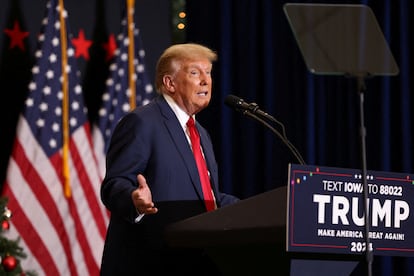Donald Trump appeals his exclusion from the Maine Republican primary
The president’s lawyers argue that he did not take part in any insurrection and that his speeches were protected by freedom of expression


This year’s U.S. presidential election has begun being played out in the courts. Former President and now Republican candidate Donald Trump has appealed to the Maine Superior Court the decision of Secretary of State Shenna Bellows to exclude him from the Republican primary in that state. Trump’s lawyers believe that Bellows’ interpretation that, under the 14th Amendment, he cannot run for having participated in a “rebellion or insurrection” is incorrect.
In parallel, Trump is preparing his appeal to the Supreme Court against the decision of the highest judicial body of Colorado to prevent him from participating in the primaries in that state, also in application of the 14th Amendment. In both states the primaries are held next March 5, known as Super Tuesday, the date on which more than a third of the delegates who will designate the Republican presidential candidate are chosen.
In the Maine appeal, Trump’s defense argues the grounds on which it considers his exclusion unlawful. The lawyers say that the secretary of state’s decision was “the product of a process infected by bias.” Trump’s lawyers believe that Bellows should have recused himself because of her alleged bias against the former president and that she had no legal authority to make such a decision even if it were true that he had participated in an insurrection.
The letter indicates that it is not the Secretary of State who must apply the 14th Amendment, but that the disqualification of a candidate would correspond to the electoral college and Congress. The third section of the 14th Amendment says: “No person shall be a Senator or Representative in Congress, or elector of President and Vice-President, or hold any office, civil or military, under the United States, or under any State, who, having previously taken an oath, as a member of Congress, or as an officer of the United States, or as a member of any State legislature, or as an executive or judicial officer of any State, to support the Constitution of the United States, shall have engaged in insurrection or rebellion against the same, or given aid or comfort to the enemies thereof.” It adds that this veto may be lifted by Congress through the vote of two-thirds of each Chamber. It is an amendment passed in 1868, three years after the end of the Civil War, that sought to prevent Confederate rebels from occupying positions of power.
Trump’s appeal argues that this provision is not self-executing and leaves no role for state officials in its enforcement. The rule, they argue, prohibits certain individuals from holding specific offices, [but] not from running for or being elected to them. They also note that it does not apply to President Trump because he has never served as an “official of the United States” and has never taken “an oath to support the Constitution,” but rather the president’s oath is to “preserve, protect, and defend” the Constitution.
They add that the amendment refers to any “official of the United States,” a term that, according to their interpretation, does not apply to the president. Curiously, the legal tables have been turned: in the New York fraud case, the former president’s lawyers said that he should be moved to a federal court because Trump was a “United States official” and the prosecution successfully argued otherwise.
On top of all that, lawyers say Trump did not take part in any insurrection. The public speeches on which Ballows’ decision was based, including the one he gave on January 6, 2021 before the assault on the Capitol, are protected by freedom of expression, the appeal states.
The Secretary of State’s decision is on hold pending judicial appeals. The Superior Court must rule before January 17. Its decision will be appealable before the Supreme Court of Maine and the sentence it dictates, in turn, can be appealed before the nine justices of the Supreme Court of the United States, with a supermajority of six conservative judges, three of them appointed by Trump himself.
These judges will also have to resolve the appeal that Trump’s lawyers plan to present this week against the ruling of the Colorado Supreme Court that excluded him from the primaries in that state. The highest court in the country has never ruled on the interpretation of section 3 of the 14th Amendment, and its decision will apply in the other states where Trump’s eligibility has also been questioned on the same grounds.
Sign up for our weekly newsletter to get more English-language news coverage from EL PAÍS USA Edition
Tu suscripción se está usando en otro dispositivo
¿Quieres añadir otro usuario a tu suscripción?
Si continúas leyendo en este dispositivo, no se podrá leer en el otro.
FlechaTu suscripción se está usando en otro dispositivo y solo puedes acceder a EL PAÍS desde un dispositivo a la vez.
Si quieres compartir tu cuenta, cambia tu suscripción a la modalidad Premium, así podrás añadir otro usuario. Cada uno accederá con su propia cuenta de email, lo que os permitirá personalizar vuestra experiencia en EL PAÍS.
¿Tienes una suscripción de empresa? Accede aquí para contratar más cuentas.
En el caso de no saber quién está usando tu cuenta, te recomendamos cambiar tu contraseña aquí.
Si decides continuar compartiendo tu cuenta, este mensaje se mostrará en tu dispositivo y en el de la otra persona que está usando tu cuenta de forma indefinida, afectando a tu experiencia de lectura. Puedes consultar aquí los términos y condiciones de la suscripción digital.








































